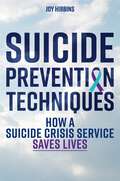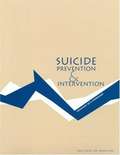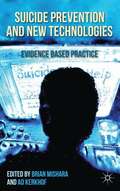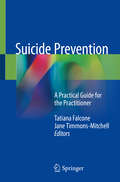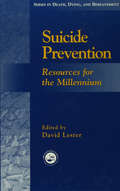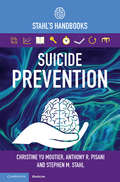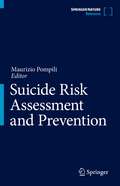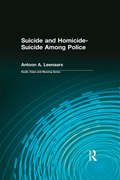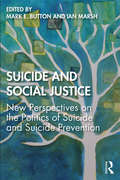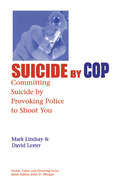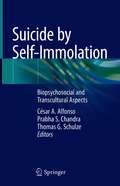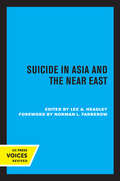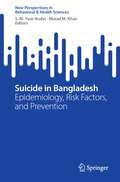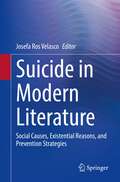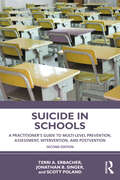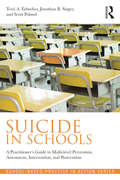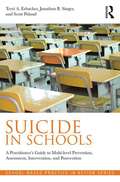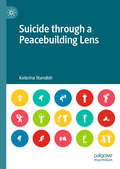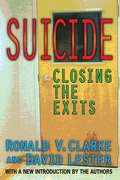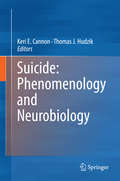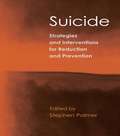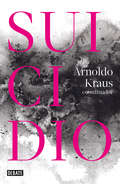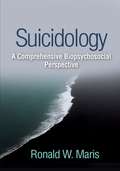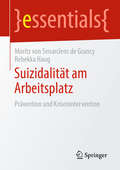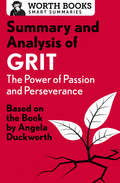- Table View
- List View
Suicide Prevention Techniques: How a Suicide Crisis Service Saves Lives
by Joy HibbinsAn unprecedented insight into the approach used by the innovative Suicide Crisis charity, a crisis centre that has so far achieved a zero suicide rate amongst their clients. This book explains their ethos, how they work and the ways in which their services operate.The idea for the service grew out of the author's own lived experience of suicidal crisis, and her inability to find the right kind of help. This experience provides an understanding and awareness of what suicidal clients go through and the kind of help they require, and the success rate of the charity proves that the techniques used are effective. Covering relationship-building, providing intensive support, achieving a balance between protecting clients and giving them control, engaging high-risk men least likely to seek help, assessing risk accurately and more, this groundbreaking approach provides what is needed to save lives of people in suicidal crisis.The author's royalties for this book are being donated to the charity Suicide Crisis.
Suicide Prevention and Intervention: summary of a workshop
by Sara K. GoldsmithThe National Academies Press (NAP)--publisher for the National Academies--publishes more than 200 books a year offering the most authoritative views, definitive information, and groundbreaking recommendations on a wide range of topics in science, engineering, and health. Our books are unique in that they are authored by the nation's leading experts in every scientific field.
Suicide Prevention and New Technologies: Evidence Based Practice
by Brian L. Mishara Ad J. F. M. KerkhofThe internet, smartphones, computer self-help programmes and other technological advances are the new frontiers of suicide prevention, with organisations around the world rapidly expanding these services. This book provides a critical overview of new technologies in suicide prevention and presents promising practices and future perspectives.
Suicide Prevention: A Practical Guide For The Practitioner
by Tatiana Falcone Jane Timmons-MitchellThis volume is a guide for the hospital workforce related to suicide prevention. Written by experts in the field, this text is the only one that also includes the revised DSM-5 guidelines. It is also the first to cover both prevention in one concise guide, offering a well-rounded approach to long- and short-term prevention. The book begins by establishing the neurobiology of suicide before discussing the populations at risk for suicide and the various environments where they may present. The book addresses the epidemiology, including groups at heightened risk; etiology, including several types of risk factors; prevention, including large-scale community-based activities; and postvention, including the few evidence-based approaches that are currently available. Unlike any other text on the market, this book does not simply focus on one particular demographic; rather, the book covers a wide range of populations and concerns, including suicide in youths, racial minorities, patients suffering from serious mental and physical illnesses, psychopharmacological treatment in special populations, and a wide array of challenging scenarios that are often not addressed in the very few up-to-date resources available.Suicide Prevention is an outstanding resource for psychiatrists, psychologists, hospitalists, primary care doctors, nurses, social workers, and all medical professionals who may interface with suicidal patients.
Suicide Prevention: Resources for the Millennium (Psychology Of Emotions, Motivations And Actions Ser.)
by David LesterThis study presents an evaluation of the past, present and future of suicidal behaviour and efforts to prevent or facilitate suicide. Authors from the varying disciplines of psychology, sociology and psychiatry analyze suicide in the opening chapters. Through the exploration of the roles of these disciplines, the roles of primary physicians, and the impact of suicide prevention education in schools, the contributors describe the history of suicidology and the changes necessary for improvement. The book concludes with a section detailing the goals and activities of organizations designed to prevent or facilitate suicide.
Suicide Prevention: Stahl's Handbooks (Stahl's Essential Psychopharmacology Handbooks)
by Stephen M. Stahl Christine Yu Moutier Anthony R. PisaniThe current suicide public health crisis and advances in clinical practice have increased the need for clear, evidence-informed guidance on suicide prevention in healthcare. This clinical suicide prevention handbook is an essential resource for mental health and primary care professionals, and any practitioner aiming to ensure their practice is up-to-date, patient-centred and consistent with the most current standards of care. Starting with a summary of the science and public health model of suicide, the book offers quick tips for suicide screening, risk assessment, interventions, and follow-up communication. It discusses medicolegal risk management, how health systems can prevent suicide and provides highly specialized guidance for clinicians following the loss of a patient to suicide. Focused sections include incorporating social media into care plans, telemedicine, issues related to culture and race/ethnicity, and working with specific populations. It introduces an integrated, prevention-oriented approach to suicide prevention, incorporating realistic supports, foreseeable changes, and strategies.
Suicide Risk Assessment and Prevention
by Maurizio PompiliThis book explores suicide prevention perspectives from around the world, considering both professionals’ points of view as well as first-person accounts from suicidal individuals. Scholars around the globe have puzzled over what makes a person suicidal and what is in the minds of those individuals who die by suicide. Most often the focus is not on the motives for suicide, nor on the phenomenology of this act, but on what is found from small cohorts of suicidal individuals. This book offers a tentative synthesis of a complex phenomenon, and sheds some light on models of suicide that are less frequently encountered in the literature. Written by international experts, it makes a valuable contribution to the field of suicidology that appeals to a wide readership, from mental health professionals to researchers in suicidology and students.
Suicide and Homicide-Suicide Among Police
by Antoon A Leenaars Dale A LundThe goal of this book is to fully explore what the author refers to as 'the near epidemic levels of suicide and homicide-suicide' among law enforcement officers, and ultimately to offer recommendations and best practices with which to better address the problem. The book begins by discussing suicide in some depth, for one has to know suicide, unequivocally, to understand a suicidal or homicidal-suicidal officer. Suicide and homicide-suicide are complex, multi-determined events - the result of an interplay of individual, relational, social, cultural and environmental factors. The complexity of causation necessitates a parallel complexity of knowledge. There are at least two avenues to understanding: the nomothetic (general) approach, which deals with generalizations using empirical, statistical and demographic methods or techniques; and the idiographic (specific) approach, which typically involves the intense study of individuals. This book explores both. Attempting to be mindful of the needs of the office on the street, the mental health provider, the administrator, the forensic specialist, and the survivors of these needless tragedies, the belief is that by amalgamating the concerns of a diverse audience, we can meet the challenge of identifying at-risk individuals and situations, and saving lives.
Suicide and Social Justice: New Perspectives on the Politics of Suicide and Suicide Prevention
by Ian Marsh Mark E. ButtonSuicide and Social Justice unites diverse scholarly and social justice perspectives on the international problem of suicide and suicidal behavior. With a focus on social justice, the book seeks to understand the complex interactions between individual and group experiences with suicidality and various social pathologies, including inequality, intergenerational poverty, racism, sexism, and homophobia. Chapters investigate the underlying and often overlooked connections that link rising rates and disproportionate concentrations of suicide within specific populations to wider social, political, and economic conditions. This edited volume brings diverse scholarly and social justice perspectives to bear on the problem of suicide and suicidal behavior, equipping researchers and practitioners with the knowledge they need to fundamentally rethink suicide and suicide prevention.
Suicide by Cop: Committing Suicide by Provoking Police to Shoot You (Death, Value and Meaning Series)
by Mark Lindsay David Lester, PhD.This book examines what we know about the phenomenon of suicide by cop and places this behavior in a broader context. For example, some murder victims (perhaps as many as a quarter) provoke the murderer, to some extent, into killing them-so-called victim-precipitated homicide. In some cases, it has been suspected that murderers kill and act thereafter in such a way as to provoke the state into executing them. The authors then examine some of the issues specific to suicide by cop, such as whether there is a racial bias in these acts and what the legal implications are. Finally, they discuss the process of hostage negotiation (since those involved in suicide by cop often take hostages during the confrontation with police), the need to provide counseling for police officers involved in suicide-by-cop incidents, and how we might reduce the incidence of this behavior.
Suicide by Self-Immolation: Biopsychosocial and Transcultural Aspects
by César A. Alfonso Prabha S. Chandra Thomas G. SchulzeThis book addresses biopsychosocial and transcultural determinants of suicide by self-immolation, populations at risk throughout the world and prevention strategies specifically designed for young women in fragile environments. Self-immolation, the act of burning oneself as a means of suicide, is rare in high-income countries, and is usually a symbolic display of political protest among men that generally receives international media coverage. In contrast, in low- and-middle-income countries it is highly prevalent, primarily affects women, and may be one of the most common suicide methods in regions of Central and South Asia and parts of Africa. Psychiatric conditions, like adjustment disorders, traumatic stress disorders, and major depression, and family dynamics that include intimate partner violence, forced marriages, the threat of honor killings, and interpersonal family conflicts in a cultural context of war-related life events, poverty, forced migration and ethnic conflicts are important contributing factors. Written by over 40 academic psychiatrists from all continents, sociologists, and historians, the book covers topics such as region-specific cultural and historical factors associated with suicide; the role of religion and belief systems; marginalization, oppression, retraumatization and suicide risk; countertransference aspects of working in burn centers; responsible reporting and the media; and suicide prevention strategies to protect those at risk.
Suicide in Asia and the Near East
by Lee A. HeadleyThis title is part of UC Press's Voices Revived program, which commemorates University of California Press’s mission to seek out and cultivate the brightest minds and give them voice, reach, and impact. Drawing on a backlist dating to 1893, Voices Revived makes high-quality, peer-reviewed scholarship accessible once again using print-on-demand technology. This title was originally published in 1983.
Suicide in Bangladesh: Epidemiology, Risk Factors, and Prevention (New Perspectives in Behavioral & Health Sciences)
by S. M. Yasir Arafat Murad M. KhanThis book is about suicidal behavior in Bangladesh. The book aims to be a comprehensive book on suicidal behavior in Bangladesh, based on existing evidence and expertise covering epidemiology, sources of quality data, local culture, forensic and legal aspects, health and mental health care, media and suicide, crisis management system, suicide prevention, and status of evidence in the country. This book is the first of its kind to address multiple aspects of suicidal behavior in Bangladesh.
Suicide in Modern Literature: Social Causes, Existential Reasons, and Prevention Strategies
by Josefa Ros VelascoThis book analyzes the social and contextual causes of suicide, the existential and philosophical reasons for committing suicide, and the prevention strategies that modern fictional literature places at our disposal. They go through the review of Modern fictional literature, in the American and European geographical framework, following the rationales that modern literature based on fiction can serve the purpose of understanding better the phenomenon of suicide, its most inaccessible impulses, and that has the potential to prevent suicide.From the turn of the 20th century to the present, debates over the meaning of suicide became a privileged site for efforts to discover the reasons why people commit suicide and how to prevent this behavior. Since the French sociologist and philosopher Émile Durkheim published his study Suicide: A Study in Sociology in 1897, a reframing of suicide took place, giving rise to a flourishing group of researchers and authors devoting their efforts to understand better the causes of suicide and to the formation of suicide prevention organizations. A century later, we still keep on trying to reach such an understanding of suicide, the nature, and nuances of its modern conceptualization, to prevent suicidal behaviors.The question of what suicide means in and for modernity is not an overcome one. Suicide is an act that touches all of our lives and engages with the incomprehensible and unsayable. Since the turn of the millennium, a fierce debate about the state’s role in assisted suicide has been adopted. Beyond the discussion as to whether physicians should assist in the suicide of patients with unbearable and hopeless suffering, the scope of the suicidal agency is much broader concerning general people wanting to die.
Suicide in Schools: A Practitioner's Guide to Multi-level Prevention, Assessment, Intervention, and Postvention
by Terri A. Erbacher Jonathan B. Singer Scott PolandThe extensively updated second edition of Suicide in Schools provides school-based professionals with practical, easy-to-use guidance on developing and implementing effective suicide prevention, assessment, intervention, and postvention strategies. The Suicide in Schools Model provides readers with clear, step-by-step guidelines on how to work proactively with school personnel and community professionals, how to screen, assess, and monitor suicide risk, create collaborative safety plans, and plan for reentry after a suicidal crisis. The authors expand this new edition with detailed case examples and innovative approaches such as upstream prevention strategies, usable handouts, and internet resources to effectively work with youth facing a suicidal crisis as well as students, families, and school staff who have suffered a suicide loss. Updates include expanding the literature on cyberbullying and social media, the higher risk of suicide in ethnoracial minoritized youth and LGBTQ+ students, and the role of suicide in school violence. This book is essential reading for school-based administrators, crisis team members, and mental health professionals as well as for outside providers who work collaboratively with school districts.
Suicide in Schools: A Practitioner's Guide to Multi-level Prevention, Assessment, Intervention, and Postvention (School-Based Practice in Action)
by Terri A. Erbacher Jonathan B. Singer Scott PolandSuicide in Schools provides school-based professionals with practical, easy-to-use guidance on developing and implementing effective suicide prevention, assessment, intervention and postvention strategies. Utilizing a multi-level systems approach, this book includes step-by-step guidelines for developing crisis teams and prevention programs, assessing and intervening with suicidal youth, and working with families and community organizations during and after a suicidal crisis. The authors include detailed case examples, innovative approaches for professional practice, usable handouts, and internet resources on the best practice approaches to effectively work with youth who are experiencing a suicidal crisis as well as those students, families, school staff, and community members who have suffered the loss of a loved one to suicide. Readers will come away from this book with clear, step-by-step guidelines on how to work proactively with school personnel and community professionals, think about suicide prevention from a three-tiered systems approach, how to identify those who might be at risk, and how to support survivors after a traumatic event--all in a practical, user-friendly format geared especially for the needs of school-based professionals.
Suicide in Schools: A Practitioner's Guide to Multi-level Prevention, Assessment, Intervention, and Postvention (School-based practice in action series)
by Scott Poland; Jonathan B. Singer; Terri A. ErbacherThe authors include detailed case examples, innovative approaches for professional practice, usable handouts, and internet resources on the best practice approaches to effectively work with youth who are experiencing a suicidal crisis as well as those students, families, school staff, and community members who have suffered the loss of a loved one to suicide.
Suicide through a Peacebuilding Lens
by Katerina StandishThis book, as the first exploration of suicide in Peace and Conflict Studies (PACS), illustrates the scarcity of suicide research in the discipline and argues that the leading cause of violent death worldwide is a multifaceted phenomenon that needs to be fully comprehended as a significant and often preventable form of world-wide violence. The author supplies a theoretical framework for assessing suicide as medical or instrumental, posits interdisciplinary complementarity and offers future lines of inquiry that challenge established notions of prevention. The book presents a PACS meta-theory termed ‘encounter theory’ and supplies a suicidal peacebuilding platform via relationship. This book questions why more PACS scholars aren’t turning their attention to suicide when more people die by suicide than ethnic, religious or ‘terroristic’ violence combined.
Suicide: Closing the Exits
by Ronald V. ClarkeSuicide prevention is a major goal of the Public Health Service of the US government. This has been the case since the 1960s when the National Institute of Mental Health established a center for the study and prevention of suicide. Since then, however, the knowledge and research gathered has not bought about the reduction of suicide. Suicide: Closing the Exits was written to change this trend.This book reports a program of research concerned with preventing suicide by restricting access to lethal agents, such as guns, drugs, and carbon monoxide. It may seem implausible that deeply unhappy people could be prevented from killing themselves by "closing the exits," but the idea is not a new one and has been discussed widely in the literature.The authors argue that restricting access to lethal agents should be considered a major preventive strategy, along with the psychiatric treatment of depressed and suicidal individuals and the establishment of suicide prevention centers to counsel those in crisis. Suicide represents a major contribution to the literature. As such, it should be read by all medical practitioners, policy makers, and psychologists.
Suicide: Phenomenology and Neurobiology
by Keri E. Cannon Thomas J. HudzikThis book addresses the phenomenology, demographics, and neurobehavioral aspects of suicidal behavior and its risk factors, underscoring common neurobehavioral threads among different approaches which may underlie such extreme behavior. It additionally provides an overview of new approaches, such as imaging techniques to identify at-risk individuals or in response to drug treatment associated with suicidal behavior, neurodevelopmental approaches, genetic and epigenetic linkages to suicidal behavior, animal models of specific risk factors, as well as potential biomarkers being employed to help assess risk.
Suicide: Strategies and Interventions for Reduction and Prevention
by Stephen PalmerAll practitioners working in the caring and helping professions face many challenges and questions when dealing with suicidal clients: Is this client being serious? Can I do more? What should I do? Should I refer on? Should I break confidentiality? Have I assessed this client correctly? Both experienced practitioners and trainees wish to have more knowledge about assessing and dealing with suicidal clients. Suicide: Strategies and Interventions for Reduction and Prevention examines myths about suicide, explores facts and statistics at national and international levels, and uses client cases to uncover thoughts leading to suicidal behaviour. The editor offers an insight into what can be done in the community, and within therapeutic settings when working with this challenging client group. Contributions are divided into four parts, covering: suicide: statistics, research, theory and interventions personal experience of suicide three therapeutic approaches to prevent suicide group interventions. Featuring chapters from a range of experienced practitioners, this book provides a wealth of information on strategies and possible interventions. The addition of a self-harm management plan, assessment checklists, and list of useful organizations makes it essential reading for both mental health professionals, and those in training.
Suicidio
by Arnoldo KrausSegún datos de la OMS, el suicidio es la segunda causa de defunción entre las personas jóvenes, con un total aproximado de 800 000 muertes al año a nivel mundial. Esto lo convierte en uno de los problemas de salud mental más preocupantes del presente, situación que se agrava debido a la creciente desigualdad económica y social, así como a la depresión debida a la pandemia por covid-19. En este libro, Arnoldo Kraus reúne a algunas de las voces más relevantes del panorama científico, intelectual y literario de nuestro país para discutir el fenómeno del suicidio, en un intento por comprenderlo mejor, sin mitos ni prejuicios. Algunas de las preguntas que cruzan estas páginas indagan sobre las circunstancias que propician los pensamientos suicidas, sobre la posibilidad de prevenirlo y sobre la necesidad de que no se estigmatice y se comprenda como un derecho irrenunciable cuando la vida ya no es digna ni plena. Lejos deofrecer respuestas definitivas o de censurar los hechos desde la superioridad moral, la intención principal de estos textos es propiciar un diálogo honesto y plural sobre uno de los problemas más profundos de la condición humana : la terrible angustia de sentir que la vida no vale la pena. Asunción Álvarez del Río | Roger Bartra Marisa Belausteguigoitia Rius | Sergio García Ramírez | Enrique Graue | Arnoldo Kraus | Marta Lamas | Antonio Lazcano | Jorge Linares | Ana López | Sandra Lorenzano | María Elena Medina-Mora | Eduardo Matos Moctezuma | Mineko Mori | Laura Emilia Pacheco | Vicente Quirarte | Jesús Ramírez-Bermúdez | Eunice Rendón | Latife Salame | Beatriz Vanda | José Woldenberg
Suizidalität am Arbeitsplatz: Prävention und Krisenintervention (essentials)
by Moritz von Senarclens de Grancy Rebekka HaugDas essential bespricht Aspekte des Suizidrisikos im Unternehmen und stellt Präventionsmaßnahmen und Maßnahmen zur Krisenintervention vor. Der Autor und die Autorin führen Techniken wie das Containing ein und diskutieren den Umgang mit emotionalen Reaktionen wie Hoffnungslosigkeit, Ohnmachtsgefühle oder Autoaggressivität. Psychoanalytisches Hintergrundwissen und ein kulturgeschichtlicher Überblick zum Suizid bereichern den Band. Besondere praxisrelevante Aspekte sowie rechtliche Fragen zum Suizid am Arbeitsplatz runden die Einführung ab.
Summary and Analysis of Grit: Based on the Book by Angela Duckworth (Smart Summaries)
by Worth BooksSo much to read, so little time? This brief overview of Grit tells you what you need to know—before or after you read Angela Duckworth&’s book. Crafted and edited with care, Worth Books set the standard for quality and give you the tools you need to be a well-informed reader. This short summary and analysis of Grit by Angela Duckworth includes: Historical contextChapter-by-chapter summariesImportant quotesFascinating triviaGlossary of termsSupporting material to enhance your understanding of the original work About Angela Duckworth&’s Grit: Psychologist Angela Duckworth blows the lid off of theories that suggest IQ and socioeconomic status are the sole predictors of success. Not intellectually gifted, according to her traditional, Asian-American father, Duckworth nevertheless became a MacArthur &“Genius.&” Winning the award led her to reflect upon the qualities that got her there: perseverance and passion. Interviewing dozens of the world&’s winners, Duckworth ventures into the playing fields of achievement, speaking with CEOs and coaches, and visits West Point, competitive swim teams, and even the National Spelling Bee to discover the common threads. Pulling from history, as well as cutting-edge neuroscience and behavioral science, Grit offers tips and advice for everyone—from parents to athletes to entrepreneurs—about how getting gritty can help you to succeed. The summary and analysis in this ebook are intended to complement your reading experience and bring you closer to a great work of nonfiction.
